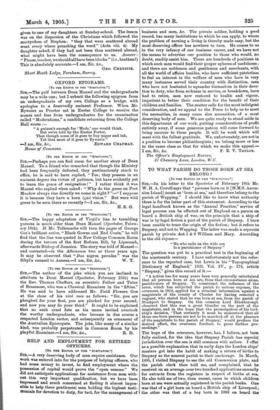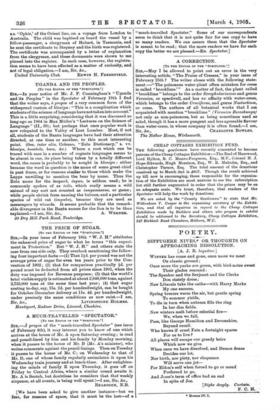TO WHAT PARISH DO THOSE BORN AT SEA BELONG?
(To THE EDITOR OF THE "SPECTATOR."
SIR,—In his letter to the Spectator of February 18th Mr. W. H. A. Cowell says that "persons born on it [H.M.S. Ascen-
sion Island] count as born at sea,' and therefore belong to the parish of Wapping." I should like to know what authority there is for the latter part of this statement. According to the legal handbook known as the "Annual Practice," service of legal process can be effected out of England on a person on board a British ship of war, on the principle that a ship of war is by legal fiction a part of the parish of Stepney. I have been unable to trace the origin of the fiction ; but it refers to Stepney, and not to Wapping. The latter was made a separate parish by private Act 5 & 6 William and Mary. According to the old rhyme- " He who sails on the wide sea Is a parishioner of Stepney."
The question was put to a practical test in the beginning of the nineteenth century. I have unfortunately not the refer- ence to the reported case, but Lewis in his "Topographical Dictionary of England," 1831, Vol. IV., p. 174, article "Stepney," gives this record of it :—
"A notion has for many years been very generally entertained that all persons born at sea are, from that circumstance alone, parishioners of Stepney. To counteract the influence of the error, which has subjected the parish to serious expense, the overseers, in 1813, applied for a criminal information against a magistrate of the county of Chester for having removed a vagrant, who stated that he was born at sea, from the parish of Stockport to Stepney. On this occasion Lord Ellenborough observed that this was a great blunder on the part of the magistrate, and in the hope that the promulgation of his lord- ship's decision, 'That certainly it must be understood that all those sea-born persons are not to be marched off at the pleasure of the magistrate to the parish of Stepney,' would produce the desired effect, the overseers forebore to press further pro- ceedings."
The hope of the overseers, however, has, I believe, not been fully realised, for the idea that Stepney Parish has especial.
jurisdiction over the sea is still common with sailors. I offer as a possible explanation that in early days the London ships' masters got into the habit of making a return of births to Stepney as the nearest parish to their anchorage. In March, 1895, I visited Stepney to see the old Communion plate, and the parish clerk then told me, and complained, that he received on an average over two hundred applications annually for extracts from the registers in respect of births at sea. He also told me of two, then recent, cases in which children born at sea were actually registered in the parish books. One was that of a girl born on board a British ship of Liverpool; the other was that of a boy born in 1893 on board the Ophir,' of the Orient line, on a voyage from London to Australia. The child was baptised on board the vessel by a fellow-passenger, a clergyman of Hobart, in Tasmania, and he sent the certificate to Stepney and the birth was registered. The certificate was accompanied by a letter of explanation from the clergyman, and these documents were shown to me pinned into the register. In each case, however, the registra- tion seems to have been effected as a matter of curiosity, and not of legal obligation.—I am, Sir, &c.,











































 Previous page
Previous page